- Joined
- Oct 9, 2007
- Messages
- 47,499 (7.49/day)
- Location
- Hyderabad, India
| System Name | RBMK-1000 |
|---|---|
| Processor | AMD Ryzen 7 5700G |
| Motherboard | ASUS ROG Strix B450-E Gaming |
| Cooling | DeepCool Gammax L240 V2 |
| Memory | 2x 8GB G.Skill Sniper X |
| Video Card(s) | Palit GeForce RTX 2080 SUPER GameRock |
| Storage | Western Digital Black NVMe 512GB |
| Display(s) | BenQ 1440p 60 Hz 27-inch |
| Case | Corsair Carbide 100R |
| Audio Device(s) | ASUS SupremeFX S1220A |
| Power Supply | Cooler Master MWE Gold 650W |
| Mouse | ASUS ROG Strix Impact |
| Keyboard | Gamdias Hermes E2 |
| Software | Windows 11 Pro |
In the era of Artificial Intelligence of Things (AIoT), Industrial PC (IPC) is expected more than just a computer for general data processing. Faced with the increasing workload at the edge, end devices are required to be smart, automated and interconnected, which reflects on the demands of AI computing and M2M (Machine-to-Machine) communication in small-sized PCs.
The demand for AI computing emerged on the account of the decentralization trends in recent years to reduce cloud computing workloads and costs, and to reinforce AI performance at the edge, high-end embedded solutions is a must. But to downsize them and meanwhile support the conditions required by edge environments, like tight spaces and abrupt temperature changes, it's definitely a challenge for IPC manufactures.
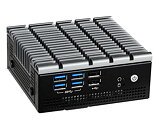
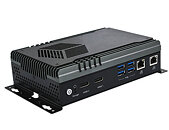
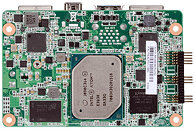
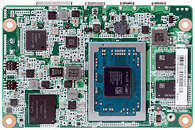
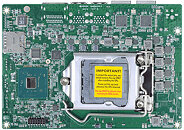
Computing decentralization also infused diversity and heterogeneity into AIoT framework that further stresses the importance of integration capability. Edge computing is an integrative application that requires the synergy of multiple devices. That is, devices should be able to communicate, even though their operating systems differ from each others and bring compatibility issues on data storage, processing and transferring.
Responding to above demands, DFI, with decades of experience in developing small-sized embedded solutions, has a full product portfolio as countermeasures with extra benefits to help clients optimize their AIoT ecosystem.
The Pi-sized GHF51 and ALF51 have AMD and Intel x 86 platforms downsized into the 1.8" boards to boost industrial IoT development. To tackle more complicated tasks, CS551 condenses desktop-platform power into the 3.5" SBC, and has the processor-warming mechanism under -30°C that ensures seamless operation in dramatic temperature change. With high performance, the designs are easier to not only leverage the AI power but also run virtual machine software to solve the data compatibility issue and amplify the effect of AIoT.
For market-ready solutions, DFI releases an array of x86-based mini PCs, such as EB100-KU for IoT gateway and industrial NUC and ES220-CS featuring as the first 35 W desktop PC with REAL DUAL 4K HDMI supported.
Based on the commitment to customers, DFI continues to develop and optimize products to help system integrators to quickly build systems and create new business opportunities to facilitate AIoT.
For more information, visit the product pages of the GHF51, ALF51, CS551, EB100-KU, and ES220-CS.
View at TechPowerUp Main Site
The demand for AI computing emerged on the account of the decentralization trends in recent years to reduce cloud computing workloads and costs, and to reinforce AI performance at the edge, high-end embedded solutions is a must. But to downsize them and meanwhile support the conditions required by edge environments, like tight spaces and abrupt temperature changes, it's definitely a challenge for IPC manufactures.





Computing decentralization also infused diversity and heterogeneity into AIoT framework that further stresses the importance of integration capability. Edge computing is an integrative application that requires the synergy of multiple devices. That is, devices should be able to communicate, even though their operating systems differ from each others and bring compatibility issues on data storage, processing and transferring.
Responding to above demands, DFI, with decades of experience in developing small-sized embedded solutions, has a full product portfolio as countermeasures with extra benefits to help clients optimize their AIoT ecosystem.
The Pi-sized GHF51 and ALF51 have AMD and Intel x 86 platforms downsized into the 1.8" boards to boost industrial IoT development. To tackle more complicated tasks, CS551 condenses desktop-platform power into the 3.5" SBC, and has the processor-warming mechanism under -30°C that ensures seamless operation in dramatic temperature change. With high performance, the designs are easier to not only leverage the AI power but also run virtual machine software to solve the data compatibility issue and amplify the effect of AIoT.
For market-ready solutions, DFI releases an array of x86-based mini PCs, such as EB100-KU for IoT gateway and industrial NUC and ES220-CS featuring as the first 35 W desktop PC with REAL DUAL 4K HDMI supported.
Based on the commitment to customers, DFI continues to develop and optimize products to help system integrators to quickly build systems and create new business opportunities to facilitate AIoT.
For more information, visit the product pages of the GHF51, ALF51, CS551, EB100-KU, and ES220-CS.
View at TechPowerUp Main Site




